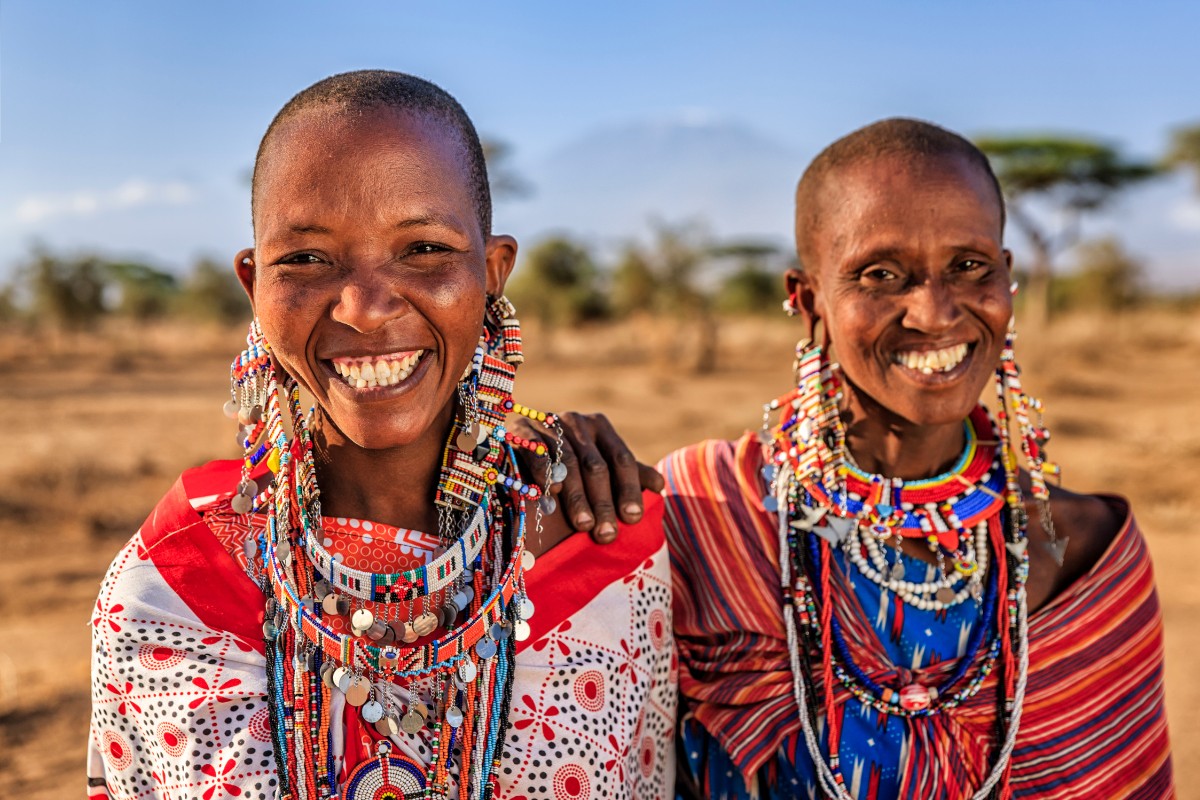
Kenya, often referred to as the “cradle of humanity,” is a country brimming with diversity, beauty, and rich cultural heritage. From the Maasai warriors of the savannah to the coastal Swahili people, Kenya is home to numerous ethnic groups, each with its distinct traditions, customs, and way of life. Let’s take a look at five of the most famous groups…
1. The Maasai
The Maasai, renowned for their vibrant red robes, intricate beadwork, and remarkable pastoral lifestyle, are probably Kenya's most iconic ethnic group. They are known for their deep connection with nature and the preservation of their traditions despite modern influences. Living in the vast savannahs, the Maasai rely on cattle as a symbol of wealth and livelihood. Their nomadic lifestyle reflects their harmonious relationship with the land and their respect for wildlife.
Section Type: standardWidthImageS

Central to Maasai culture are their elaborate coming-of-age ceremonies. Young warriors undergo rituals that mark their transition into adulthood, such as the circumcision ceremony. These ceremonies are vibrant displays of music, dance, and bravery, showcasing the Maasai's unique cultural identity. The Maasai are skilled artisans who create intricate beadwork, colorful jewelry, and distinctive attire, representing their heritage and storytelling.
2. The Swahili
All along the Kenyan coast, we encounter the Swahili people, a fusion of African, Arab, and Persian influences. Their cultural heritage is deeply rooted in their coastal towns, such as Lamu and Mombasa, where history intertwines with vibrant traditions. The Swahili are known for their unique architecture, with intricately carved doors and stunning coral stone houses that showcase their craftsmanship.
Section Type: standardWidthImageS
Intricately carved wooden door in Lamu, Kenya (Photo: Justin Clements, Lamu door, CC BY 2.0)

Cuisine is an essential part of Swahili culture, blending spices and flavors from different cultures. Explore the tantalizing tastes of dishes like biryani, pilau, and mahamri. The Swahili are also renowned for their traditional music, taarab, which combines African rhythms with Arabic melodies. This music, accompanied by enchanting poetry, tells stories of love, loss, and the beauty of the coastal region.
3. The Luo
Moving westwards, in the areas surrounding Lake Victoria, we encounter the Luo people, known for their rich history and cultural heritage. The Luo community places a strong emphasis on music, and the nyatiti, a traditional eight-stringed lyre, is their most prominent instrument. The captivating rhythm of the nyatiti resonates during traditional ceremonies and celebrations.
Section Type: standardWidthImageS
Woman playing the nyatiti (Photo: Onesmo Daniel, African local music instrument -Nyatiti 02, CC BY-SA 4.0)

The Luo have a deep-rooted storytelling tradition. The Dholuo language, spoken by the Luo, is rich in proverbs and oral literature, passing down historical accounts from generation to generation. Notable figures like the late musician Ayub Ogada and Nobel laureate Wangari Maathai have emerged from the Luo community, contributing to Kenya's cultural and intellectual landscape.
4. The Kikuyu
As the largest ethnic group in Kenya, the Kikuyu people play a significant role in the country's history and development. They have a rich agricultural heritage, cultivating crops such as coffee, tea, and bananas. Traditional ceremonies, like the initiation rite of passage for young men and women, symbolize the transition into adulthood and are accompanied by cultural rituals and blessings.
The Kikuyu have a distinct language, Gikuyu, which embodies their cultural identity and is widely spoken throughout the country. The Mau Mau struggle for independence is a defining chapter in Kikuyu history, with courageous leaders like Jomo Kenyatta (independent Kenya’s first prime minister) emerging as icons of Kenya's fight for freedom. The resilience and determination of the Kikuyu people have left an indelible mark on the nation.
5. The Turkana
Venturing into the arid lands of northern Kenya, we encounter the Turkana people, a resilient pastoral community. Adaptation is key in their challenging environment, and the Turkana have developed unique skills in fishing, particularly in the vast Lake Turkana, the largest desert lake in the world, which sustains their livelihood. Women play a crucial role in Turkana society, contributing to household economies and playing leadership roles in their communities.
The Turkana celebrate their cultural heritage through the vibrant Turkana festival, a gathering that showcases their music, dance, traditional attire, and crafts. Beaded adornments, worn by both men and women, are central to their cultural identity and reflect their distinct ethnic pride. The festival is an opportunity for the Turkana to share their traditions, exchange ideas, and strengthen their community bonds.
Section Type: standardWidthImageS
Turkana people showcasing their lively heritage during the Turkana Cultural Festival (Photo: Marta Panco, Turkana people dance, CC BY-SA 4.0)

Section Type: cta
Meet Kenya’s fascinating people for yourself on a once-in-a-lifetime East Africa safari. Check out our most popular Kenya tours. then speak to a Destination Expert about curating the Kenyan odyssey of your dreams.


Copyright © 2026 SA Luxury Expeditions LLC, All rights reserved | 8 The Green, Suite A, Dover, DE, 19901 | 415-549-8049











